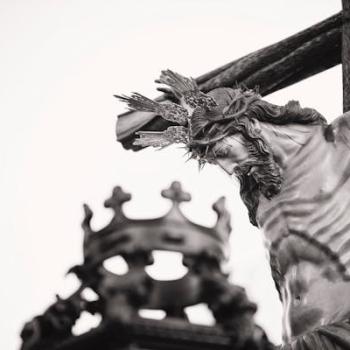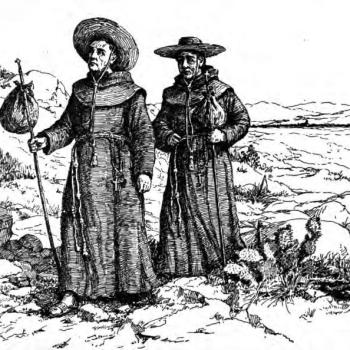I recently blogged about the Thirty Years War, which erupted in May 1618 – four hundred years ago this month. Although this sprawling religious war was critical for the subsequent history of Europe and the West, and for Christendom itself, it remains little known in the English-speaking world. The same comment applies to much of the literature and culture stemming from that conflict, including what may well be the greatest classic European novel that remains unfamiliar even to most educated English-speakers. And it is a major Christian work.
This is The Adventures of Simplicius Simplicissimus, a short but vastly important book by Johann Jakob Christoffel von Grimmelshausen, published in 1668. The full subtitle is The account of the life of an odd vagrant named Melchior Sternfels von Fuchshaim: namely where and in what manner he came into this world, what he saw, learned, experienced, and endured therein; also why he again left it of his own free will. Let me say here just why it is so extraordinarily significant in itself, and as a vehicle for recording the (really grim) life experience of very ordinary people in bygone centuries – the way they thought and lived. Not knowing the book means missing an astonishing treasure for reconstructing early modern history, and religion. The Penguin Classics edition is terrific.
Johann von Grimmelshausen (1621-76) served as a soldier in the Thirty Years War. Originally a Lutheran, he later converted to Catholicism. I quote from a review by Jeremy Adler:
We can be sure that he attended the local grammar school, and that he witnessed the execution of a local potter for sorcery [witchcraft] near his grandfather’s house on 1 August 1633. … after the destruction of his home town by Swedish troops in 1635, the 14-year-old Grimmelshausen was kidnapped by Croatian mercenaries along with several other children. His family was too poor to pay the ransom. He was present at the siege, sack and massacre of Magdeburg in 1631: of 30,000 citizens only 5,000 survived, and for 14 days afterwards, charred bodies were dumped in the River Elbe to prevent the spread of disease. It seems likely that he joined the regiment of Baron Hans Reinhard von Schauenburg, in which he rose through the ranks as a musketeer, before launching his career as a writer.
Not until 1837 was he positively identified as the author of Simplicius Simplicissimus. To put the work in context, Milton published the first edition of Paradise Lost in 1667. Von Grimmelshausen was a near contemporary of John Bunyan, whose Pilgrim’s Progress appeared in 1678. In a bizarre way, you can approach Simplicius Simplicissimus as a kind of cross between Pilgrim’s Progress and Don Quijote, with a dash of Baron Munchausen (Think about that for a moment). If you like Jorge Luis Borges, you’ll love Simplicius Simplicissimus.
Although he was of respectable social status, von Grimmelshausen showed remarkable empathy for the poor, the peasants and townspeople who suffered hell from the war, and from the deeds of people like himself. His book is a novel rather than a history – in fact, it is the first war novel ever written. It tells the story of a peasant boy from the region of Spessart whose family is scattered by war. That disaster then begins his wanderings as a rogue or picaro, hence the name “picaresque” for this kind of fiction. The pious hermit Samuel who tries to help him is struck by how utterly ignorant and simple he is, and thus the name Simplicissimus – a superlative of “simple.” (Historian Geoffrey Parker gives the book the title The Adventures of a German Simpleton, which is reasonable). This simpleton among simpletons is a (relative) innocent abroad. Hard though this might be to believe in light of what I am about to describe, the book is often very funny. It is also, um, highly scatological.
When we read about wars in that era, we might note that General X or the Duke of Y won a great battle and occupied a particular territory. What we easily forget is that right up to quite modern times, those armies had very little by way of supplies or logistic support, beyond what they plundered from the countryside. When they entered a town or village, they grabbed all they could, and if they felt the local people were holding out on them, they used torture. Mainstream historians say little about what it might have been living with such horrors, but von Grimmelshausen tells us, in detail:
Our maid was so handled in the stable that she could not come out; which is a shame to tell of. Our man they laid bound upon the ground, thrust a gag into his mouth, and poured a pailful of filthy water into his body: and by this, which they called a Swedish draught, they forced him to lead a party of them to another place where they captured men and beasts, and brought them back to our farm, in which company were my dad, my mother, and our Ursula [his sister]. And now they began: first to take the flints out of their pistols and in place of them to jam the peasants’ thumbs in and so to torture the poor rogues as if they had been about the burning of witches: for one of them they had taken they thrust into the baking oven and there lit a fire under him, although he had as yet confessed no crime: as for another, they put a cord round his head and so twisted it tight with a piece of wood that the blood gushed from his mouth and nose and ears. In a word, each had his own device to torture the peasants, and each peasant his several torture.
Actually, things were even worse than this suggests. I am here using an older translation, which bowdlerizes the original text. In the original, what they pour into the man’s stomach is not filthy water but liquid manure – the “Swedish Drink.” The accounts of rapes are also somewhat cleaned up. Make allowances for that in the next quotes I will give.
Unusually for his time, the author makes clear just how frequently the soldiers would rape local women. Very much as in Central or Eastern Europe in 1945, any girl or woman from eight to eighty was considered fair game (and that hunting analogy perfectly reflects the attitudes of the time). The accounts in the novel are all the more troubling because notionally they are presented from the point of view of an ignorant child. Time and again, he notes cryptically that some girl or servant maid would be taken away by the soldiers, and he then struggles to make sense of the situation:
Of the women, girls, and maidservants whom they took, I have not much to say in particular, for the soldiers would not have me see how they dealt with them. Yet this I know, that one heard some of them scream most piteously in divers corners of the house; and well I can judge it fared no better with my mother and our Ursula than with the rest. … I encountered our maid in the stable, who seemed to me wondrously tumbled, so that I knew her not, but with a weak voice she called to me, “O lad, run away, or the troopers will have thee away with them. Look to it well that thou get hence: thou seest in what plight …” And more she could not say.
When the peasants were fortunate enough to capture foraging soldiers, they treated them just as ruthlessly. In one incident, a group of soldiers catch some villagers who have just captured one of their fellows. The peasants have cut off his ears and nose, put him in a casket, and buried him alive. Naturally, the soldiers then revenge themselves on the offending peasants.
Simplicissimus records his experiences in such operations:
I must now ride on foraging parties, groom horses and clean out their stalls. Now this same foraging is neither more nor less than attacking of villages (with great pains and labor: yea, often with danger to life and limb), and there threshing, grinding, baking, stealing, and taking all that can be found; harrying and spoiling the farmers, and shaming of their maids, their wives, and their daughters. And if the poor peasants did murmur, or were bold enough to rap a forager or two over the fingers, finding them at such work (and at that time were many such guests in Hesse), they were knocked on the head if they could be caught, or if not, their houses went up in smoke to heaven.
“Shaming” women (Weiber schänden) of course signifies rape.
Quite apart from the treatment of civilians, the book tells us so much about the nature of early modern (and late medieval) warfare – the structure of armies, their recruitment and logistics, the nature of discipline, the importance of rank and concepts of honor, relations between different units, the ways in which individuals received promotions, the treatment of prisoners, the role of loot and extortion as a key factor in keeping the wars going ad nauseam.
I am not including illustrations here, but the engravings of Jacques Callot offer a perfect visual accompaniment to this story. In 1633, he published a devastating series of engravings called Les Grandes Misères de la Guerre (The Great Miseries of War, or The Miseries and Misfortunes of War), which still today offer a powerful anti-war statement. Follow the link there and you will find the complete set.
You may wonder, in such circumstances, how anyone could have survived these cumulative atrocities. Many did not. Germany lost a third of its population in the Thirty Years War.
Because historians so often focus on the war material, we easily forget that this is primarily a religious book, even a Christian classic not so far removed from Pilgrim’s Progress. By a near miracle, the hero has as a child met the pious hermit who is one of the few people then living who maintains true Christian values in this dreadful world of sin and hypocrisy. Our hero thus approaches what he sees from the standpoint of a Christian innocent. The hermit himself has been a warlord – a Scot, in fact, named Ramsay. Once a man of wealth and power, he has rejected all worldly splendor to live in a forest hut.
Simplicissimus himself then makes his own pilgrimage through the world, where he is so evidently a Holy Fool that he becomes something like a court jester to a noble lord. To people of all classes and degrees, he tells the unvarnished and obvious truth, regardless of tact or consequences. He then succumbs to wealth and temptation, falls into violence and brutality, and even earns a reputation as an able commander and war-leader, albeit a chivalrous and generous one.
When he reluctantly agrees to join a friend on a pilgrimage to the Swiss abbey of Einsiedeln – still a famous shrine today – that decision is critical to achieving his true conversion. He enters a church during an exorcism, and hears the demon that possesses the victim speak directly to him, and revealing his inner thoughts. That forces him to consider spiritual truths very seriously, and he makes his Confession before taking Communion. He finally does the only thing a decent person can do in an absurd world gone mad, namely to comprehend its vanity, and then to abandon it all and become a hermit or mystic himself. He ends up as the “old vagrant” of the book’s subtitle.
Might I even call it his Benedict Option?
I repeat, the book is absolutely not just concerned with the effects of war, and it ranges very widely: Simplicissimus even attends a witches’ sabbat, entirely by mistake (Don’t ask). The book is an amazing compendium of the kind of everyday beliefs and superstitions that Early Modern Europeans held, all the esoteric and occult notions. At every point, the book’s whole structure is conditioned by astrology, in a way that reflects the pivotal importance of that supposed science in the thought of the time.
In its otherworldly assumptions, no less than its endemic warfare, Europe around 1640 sounds a lot like much of Africa today. That is also true for the kind of religious ideas that gained popularity – not least the exorcism and spiritual warfare. In many ways, not least the role of ruthless private armies, Germany at that period resembles the Democratic Republic of Congo in the very recent past. In 1640, Central Europe was the Heart of Darkness.
Here, though, I focus chiefly on the war material because it is so powerful, and so widely applicable.And not just in Europe. Did you ever see the film Seven Samurai, about the Japanese village that calls on a group of samurai warriors to defend it from bandits? (It is the original for The Magnificent Seven). In one harrowing scene, the samurai discover the armor of all the other warriors – the “foragers” – that the peasants have murdered through the years.
If you ever study twentieth century German history, one essential source for how people lived and thought is the Munich-based satirical magazine called (what else?) Simplicissimus, which began publication in 1896. It chronicled Germany’s Wilhelmine and Weimar periods, and its cartoons and illustrations are glorious. The very name Simplicissimus was the gold standard in brilliant satire.
More about Grimmelshausen’s work next time.
One useful source on all this is Karl F. Otto, ed., A Companion to the Works of Grimmelshausen (Boydell & Brewer, 2003).
















